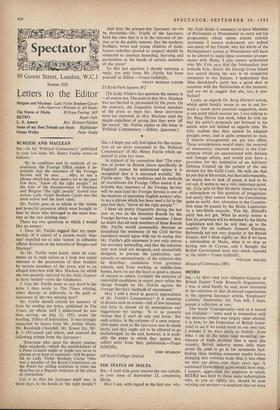THE STATUS OF MALTA
SIR,—I read with great interest the two articles in your issue of September 23, concerning Malta.
May I ask, with regard to the first one, why Mr. Cole thinks it necessary to have Members of Parliament at Westminster to carry out Lis programme, which seems almost entirely economic. I cannot understand, nor indeed can many of my friends, why the whole of the Parliamentary system at Westminster will have to be altered to make these economic arrange- ments with Malta. I also cannot understand why Mr. Cole says that the Nationalists lean towards Italy. Surely the George Cross Island was united during the war in its wonderful resistance to the Italians. I understand that Miss Strickland's party has a good deal in common with the Nationalists at the moment, and are we to suggest that she, too, is pro- Italian?
Lastly, as regards Dr. Borg Olivier's article, which quite frankly seems to me to put for- ward a much more practical suggestion, there is one point which worries me. I was talking to Dr. Borg Olivier last week, when he told me that his party's proposals put forward in his article were not limited as regards time. He fully realises that they cannot be adopted straight away, and is quite prepared to wait, if interim arrangements are put into effect. These arrangements would imply the removal of unnecessary reserved matters in the Con- stitution which are unconnected with defence and foreign affairs, and would also have a provision for the institution of an Advisory Defence Council on the pattern of the one devised for the Gold Coast. He tells me that he put this in his article, but that unfortunately, no doubt due to lack of space, it had to be cut out. It seems to me a very important point. Mr. Cole tells us that his party intend to have a referendum on this question of integration; but surely they cannot break the Constitution quite so easily. Any alteration in the Constitu- tion must be passed by the Malta Legislature by a two-thirds majority. This Mr. Mintoff's party has not got. What he surely means is that his proposals will be defeated by the Malta Legislature and that he will then go to the country for an ordinary General Election. Referenda are not very popular in the British Empire, and I think rightly so. But if we have a referendum in Malta, what is to stop us having one in Cyprus, and I thought the British Government were very much opposed to the latter.—Yours faithfully,
WILLIAM TEELINO
House of Commons, SW 1,


































 Previous page
Previous page